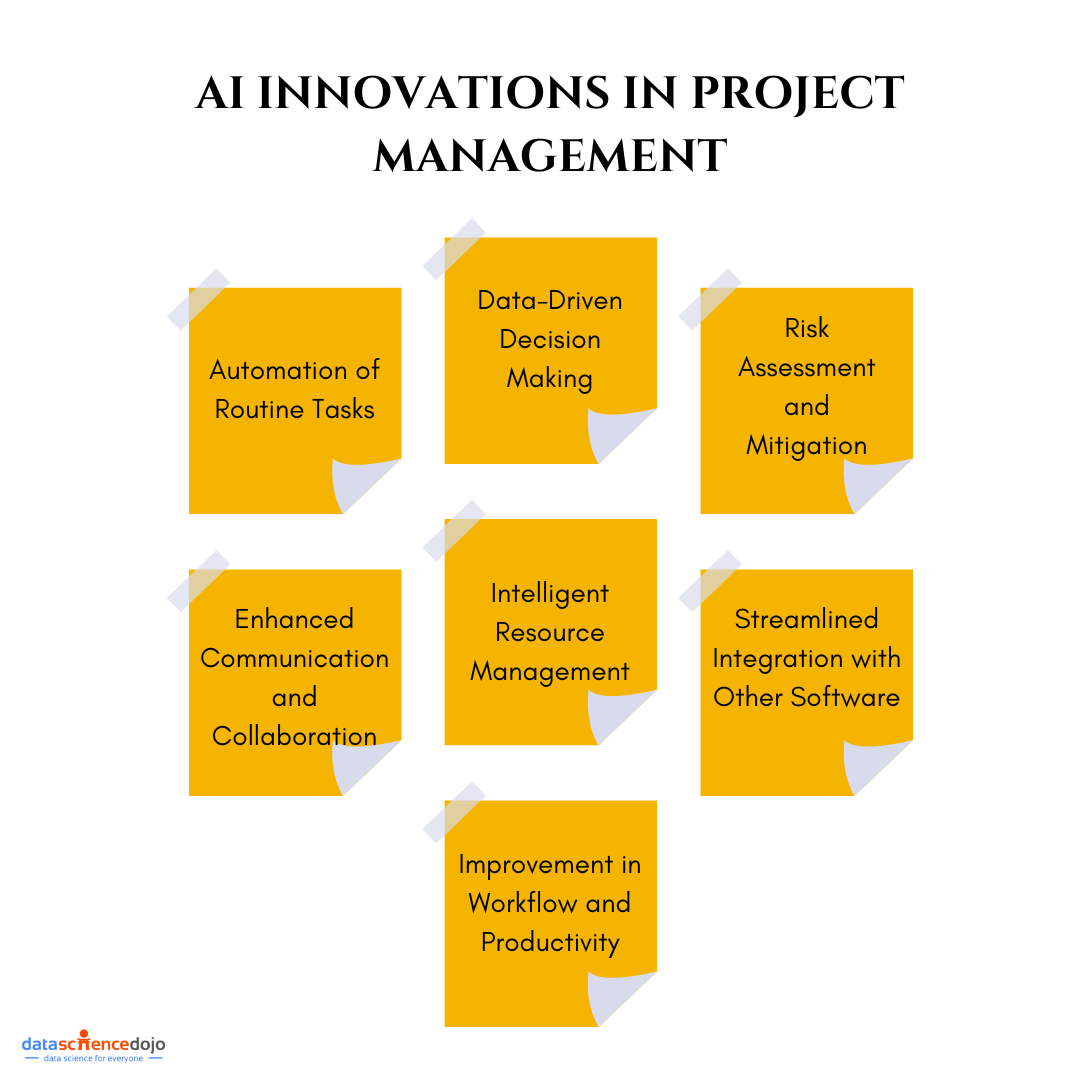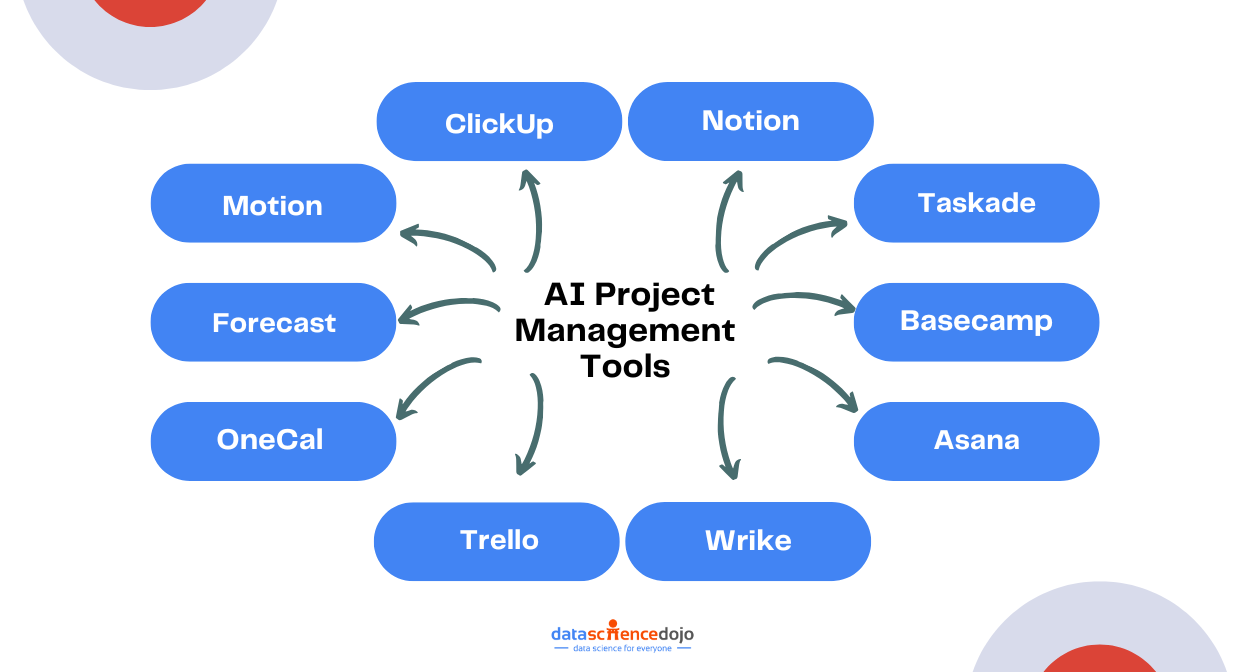The field of project management has experienced a profound transformation over the years, primarily driven by the advent of Artificial Intelligence (AI). This technological revolution has introduced an where traditional management practices are being enhanced by AI’s capabilities and efficient processes.
AI project management tools has not only modernized how projects are handled but has also enabled managers to tackle complex challenges with unprecedented precision and speed.
AI helps project managers can now make informed decisions based on predictive analytics, which provide insights into potential risks and opportunities, helping to optimize resource allocation and improve project outcomes.
AI in Project Management – Value Additions for Project Managers
Let’s delve into some of the specific advancements that AI has facilitated in project management.
Automation of Routine Tasks
AI has brought about the automation of routine and repetitive tasks within project management, such as scheduling, resource allocation, and task assignment. This has freed up project managers to focus on more strategic elements of their projects, such as stakeholder engagement and long-term planning.
Data-Driven Decision Making
With AI’s capability to analyze large sets of data, project managers can now make more informed decisions. AI tools can provide advanced analytics and data visualizations, contributing to a more data-driven approach to project management.
Risk Assessment and Mitigation
AI-powered tools can predict potential risks by analyzing patterns and data, which allows for proactive risk assessment and mitigation strategies. This can significantly enhance the ability to foresee and address issues before they arise, leading to smoother project execution.
Enhanced Communication and Collaboration
AI has made strides in improving communication and collaboration within project teams. AI-driven platforms can facilitate real-time collaboration, summarize discussions, and even generate tasks from meetings, ensuring that all team members are on the same page.
Intelligent Resource Management
AI project management tools can assist in capacity and demand planning, ensuring that resources are allocated efficiently and effectively. This helps in maximizing the utilization of available resources and in reducing wastage.
Streamlined Integration with Other Software
AI tools in project management are designed to integrate seamlessly with a wide array of third-party applications, such as CRM systems, accounting tools, and collaboration platforms. This has allowed for a more cohesive and interconnected suite of tools to support project management activities.
Improvement in Workflow and Productivity
Overall, AI project management tools have led to enhancements in workflow and productivity by automating planning tasks and integrating project tasks into daily workflows. They also help keep teams on track and maximize productivity through personalized scheduling and prioritization.
Read about Organizing the Generative AI projects better – A comprehensive guide
Top 10 AI Project Management Tools to Streamline Complex Projects
Certainly, let’s delve into the details of these innovative AI tools that are streamlining the domain of project management:
1. ClickUp
ClickUp is a multifaceted project management tool that has earned accolades for its extensive set of features. It brings to the table functionalities such as task management, document sharing, and time tracking, all wrapped in a highly customizable interface.
The AI integration within ClickUp enhances the tool’s capabilities by generating ideas, action items, documents, and summaries. For example, a project manager can utilize ClickUp AI to swiftly draft project plans or create comprehensive meeting summaries, thereby saving time and increasing productivity.
2. Notion
Notion simplifies the workspace by offering a clean and easy-to-use application for note-taking, document writing, and database creation. Its AI features stand out by providing question-and-answer capabilities, autofill, and writing assistance.
A user might leverage Notion’s AI to organize meeting notes into actionable tasks or to automate the creation of project documentation, streamlining the workflow significantly
Get Insights Into Generative AI’s Growing Influence by learning AI Project Management
3. Taskade
Taskade is particularly known for its prowess in real-time collaboration. It comes with over a thousand AI agent templates and AI prompt templates, making it a go-to choice for teams aiming to boost their collective efforts.
A use case for Taskade’s AI could be in a software development project, where it helps generate code snippets and debugging prompts that facilitate smoother collaboration among developers.
4. Basecamp
Basecamp targets small teams and startups with its streamlined project management tools. Although it lacks AI capabilities, it includes features like Move the Needle and Mission Control, which focus on project progress and overall management.
A startup could use Basecamp to track the development stages of a new product and align team objectives without the complexity of AI features.
5. Asana
Asana is at the forefront of advanced project management with its automation and AI components, known as Asana Intelligence. This system aids in planning, creating summaries, and editing content. In practice, a marketing team might employ Asana to automate their campaign planning process and use AI to generate performance reports, thus optimizing their marketing strategies.
6. Wrike
Wrike is tailored for enterprise users, offering Work Intelligence AI that aids in content generation and grammar corrections, in addition to brainstorming tools. An enterprise could integrate Wrike’s AI to automate the creation of technical documents and ensure accuracy and consistency across all materials.
7. Trello
Trello is renowned for its affordability and seamless integrations, and with the addition of AI-driven content generation and grammar correction, it becomes even more powerful. Trello’s AI can assist a project team in brainstorming new product features and automatically generating user stories for agile development.
8. OneCal
OneCal is focused on schedule management and is praised for its calendar syncing capabilities. Though it does not offer AI features, it excels in helping users manage their time effectively. A project coordinator could use OneCal to ensure all project milestones are accurately reflected in team members’ calendars, preventing scheduling conflicts.
Learn about the different types of AI as a Service
9. Forecast
Forecast is a project management tool that promises predictable execution and risk management with its AI-assisted risk and status management. Even in the absence of AI in initial plans, Forecast’s AI can be used for predicting project risks and aligning resources efficiently to mitigate potential issues.
10. Motion
Lastly, Motion is dedicated to automating project planning. While it may not include AI features out of the box, its automated scheduling and planning capabilities are noteworthy. A team could integrate Motion to automatically create task schedules, ensuring that each team member’s workload is balanced and deadlines are met.
Understand AI-powered CRMs and their role in project management
Why Project Managers Should Use AI Tools?
AI project management tools can automate a variety of tasks that streamline workflow and enhance productivity. These tasks include:
- Scheduling and Resource Allocation: AI can manage calendars and ensure optimal use of resources
- Task Assignment and Prioritization: Tools can automatically assign tasks to team members based on their availability and skillset, and prioritize tasks to align with project deadlines
- Data Analysis and Reporting: AI systems can analyze project data to generate insights and reports, helping teams to make data-driven decisions
- Risk Assessment and Mitigation: AI can predict potential project risks and suggest mitigation strategies 1.
- Communication and Collaboration: Chatbots and other AI tools can facilitate communication among team members and improve collaboration
- Document Management: AI can help in organizing and managing project-related documents
- Progress Tracking: Tools can monitor project progress and alert the team to any deviations from the plan
- Report Generation: AI can compile data and create comprehensive reports for stakeholders
By automating these tasks, AI project management tools significantly improve workflow and productivity in the following ways:
- Reducing Manual Work: Automation of routine tasks frees up time for team members to focus on strategic and creative work.
- Enhancing Efficiency: AI tools can work continuously without the need for breaks, which means they can perform tasks more quickly and with fewer errors.
- Improving Accuracy: AI’s ability to process large amounts of data can reduce the risk of human error, leading to more accurate work.
- Predictive Analytics: By analyzing past data, AI tools can forecast project timelines and outcomes, allowing for better planning and resource allocation.
Learn how to build a predictive model with Azure machine learning
- Facilitating Decision Making: The insights generated by AI tools can help project managers make more informed decisions.
- Streamlining Communication: AI-driven platforms can summarize discussions and keep all team members aligned on project goals and progress.
These improvements contribute to a smoother project management process, where teams can work more cohesively and projects can be delivered on time and within budget.
In summary, these tools represent a spectrum of AI-enhanced capabilities that cater to various project management needs, from automating mundane tasks to providing strategic insights, thereby transforming the way projects are managed and executed.






